沪教牛津版广州英语七年级上册Unit2讲义
- 格式:docx
- 大小:49.42 KB
- 文档页数:12
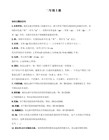

七年级上U2L1重点词汇1.national ['næʃ(ə)n(ə)l] a. 全国的,国家的,国民的national是 nation转化而来的形容词,除作“国家的,全国的,国民的”外,还可以做国有的,国立的解。
在句中常用作定语,无比较级,最高级,它还可以用作名词,表示某国国民,尤其是指侨居外国的侨民。
e.g. Baseball is the national pastime. 棒球是一项全民性的休闲运动。
Foreign nationals were asked to leave the country .外国侨民被要求离开该国。
常用搭配:national holiday 国定假日national flag 国旗national bank 国有银行national park国家公园2.decorate['dekəreɪt] vt.装饰,装潢(三单+s,过去分词+d ,现在分词去e,+ing)decorate基本意思是指“装饰”,指增加色彩或图案设计来消除背景的平淡或单调。
也可以表示粉刷房屋,可引申为“授予殊荣”如奖章,爵位等。
后可跟介词for表示“因……而授予”跟介词with搭配表示“用……装饰”“以……授予”。
它是及物动词,后跟名词或代词做宾语。
e.g. They decorated the room in bright green. 他们以鲜艳的绿色装饰了这个房间。
3.sightseeing['saɪtsiːɪŋ]n. 观光 adj. 观光(用)的,游览(用)的e.g. I spent most of my time in sightseeing. 我大部分的时间花在观光上了。
常见搭配: do some sightseeing 去游览,去参观go sightseeing 去观光in sightseeing 在游览观光4.celebrate['selɪbreɪt]vt .& vi.庆祝(节日,事件等);过节celebrate本意是指由于宗教,政治或其他意义的原因而举行的“庆祝”或“纪念活动”,着重外在的欢乐和喜庆,可引申为“颂扬”,“赞美”解。
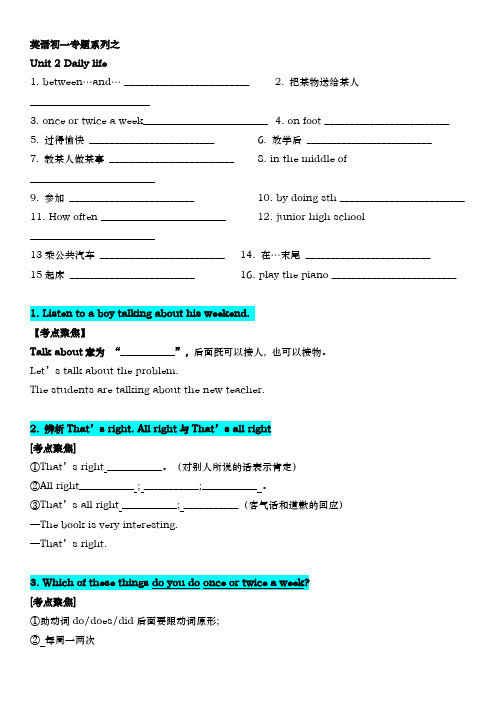
英语初一专题系列之Unit 2 Daily life1. between…and… _________________________2. 把某物送给某人________________________3. once or twice a week_________________________4. on foot _________________________5. 过得愉快_________________________6. 放学后_________________________7. 教某人做某事_________________________ 8. in the middle of_________________________9. 参加_________________________ 10. by doing sth _________________________ 11. How often _________________________ 12. junior high school_________________________13乘公共汽车_________________________ 14. 在…末尾_________________________15起床_________________________ 16. play the piano _________________________1. Listen to a boy talking about his weekend.【考点聚焦】Talk about意为“___________”,后面既可以接人, 也可以接物。
Let’s talk about the problem.The students are talking about the new teacher.2. 辨析That’s right. All right与That’s all right[考点聚焦]①That’s right ___________。
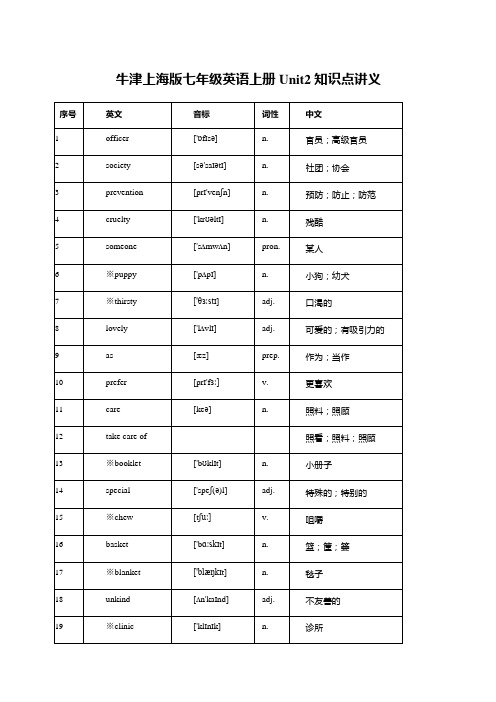
牛津上海版七年级英语上册Unit2知识点讲义知识点梳理I. Useful words and expressions1. I’m an SPCA officer.➢注意:SPCA中的“S”/es/的发音以元音开头,所以要用冠词an. 类似的字母发音以元音开头还有:F、H、L、M、N、S、X。
2. That’s right.➢注意区别:That’s right, That’s all right, All rightAll right=OK 好的;好吧That's all right意为“没关系,不客气”,用于Sorry或Thank you的回答。
That's right意为“那没错”, 表示某人的观点正确。
3. They had no food or water.➢no=not any 本句可改写为:They didn’t have any food or water.➢肯定句中连词应用and[e.g.] The students sang and danced in the park yesterday.否定句中连接并列成分应用or[e.g.]There isn’t any air or water on the moon.4. I found them and took them to the SPCA.➢take sb. / sth. to some place 把……带去(某地)bring sb. / sth. to some place 把……带来(某地)5. Would you like to keep one as your pet?➢Keep…as…:饲养…当作➢one(s) 用来代替前面出现过的单数(复数)的人或物;[e.g.] I’m looking for a cat. Do you see one?The books on this desk are newer than the ones on that desk.6. I prefer the black one.➢prefer最常见的意思是"比较喜欢"、"更喜欢"等, 可以构成以下结构:1) prefer sth/doing sth.. [e.g.] I prefer watching TV.2) prefer to do sth. [ e.g.] I prefer to go at once.3) prefer sth. /doing sth. to sth. / doing sth. = like…better than…[e.g.] I prefer coffee to tea.Mr. Wang preferred reading to doing nothing.7. How to take care of your new puppy?➢take care of + n. /pron.(代词用宾格)➢take care of = look after =care for➢好好照顾,悉心照顾take good care of = look after well8. Feed him/her 1-2 times every day.➢every day 时间副词; 每天[e.g.] I leave home for school at 7 o’clock every day.everyday = daily形容词;每天的,日常的。
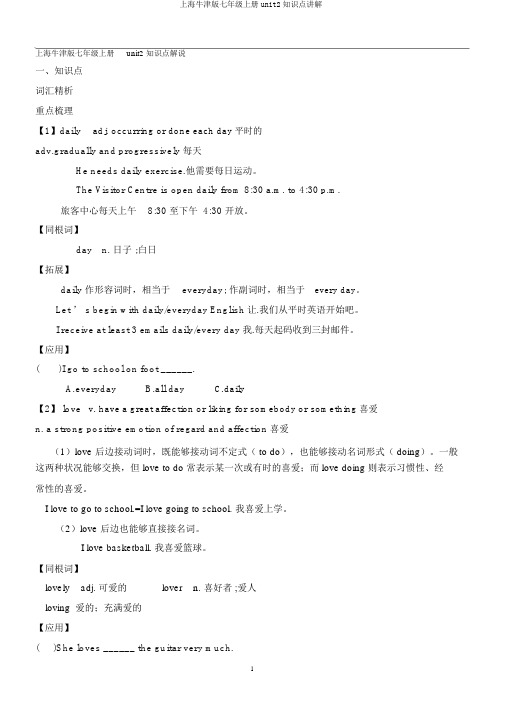
上海牛津版七年级上册unit2 知识点解说一、知识点词汇精析重点梳理【1】daily adj. occurring or done each day平时的adv.gradually and progressively每天He needs daily exercise.他需要每日运动。
The Visitor Centre is open daily from 8:30 a.m. to 4:30 p.m.旅客中心每天上午8:30 至下午 4:30 开放。
【同根词】day n. 日子 ;白日【拓展】daily 作形容词时,相当于everyday; 作副词时,相当于every day。
Let ’ s begin with daily/everyday English让.我们从平时英语开始吧。
I receive at least 3 emails daily/every day我.每天起码收到三封邮件。
【应用】()I go to school on foot ______.A.everydayB.all dayC.daily【2】 love v. have a great affection or liking for somebody or something喜爱n. a strong positive emotion of regard and affection喜爱(1)love 后边接动词时,既能够接动词不定式( to do),也能够接动名词形式( doing)。
一般这两种状况能够交换,但 love to do 常表示某一次或有时的喜爱;而 love doing 则表示习惯性、经常性的喜爱。
I love to go to school.=I love going to school. 我喜爱上学。
(2)love 后边也能够直接接名词。
I love basketball. 我喜爱篮球。
【同根词】lovely adj. 可爱的lover n. 喜好者 ;爱人loving 爱的;充满爱的【应用】()She loves ______ the guitar very much.A.playB.playingC.plays【3】 seldom adv. not often 极少;不常I seldom go to the cinema.我极少去看影。


牛津版上海版七年级上册 Unit 2 Our animal friends 说课稿一. 教材分析牛津版上海版七年级上册Unit 2 Our animal friends 是本单元的主题是动物,通过学习本单元,学生可以掌握关于动物的词汇和表达方式,同时能够运用所学知识描述动物的特点和习性。
教材内容丰富,插图生动,激发学生的学习兴趣。
二. 学情分析七年级的学生已经具备一定的基础英语知识,对于动物这一主题,学生兴趣浓厚。
但部分学生可能对英语表达动物特点和习性存在困难,因此需要在教学中给予指导和帮助。
三. 说教学目标1.知识目标:学生能够掌握关于动物的词汇,如lion, tiger, panda等,以及表达动物特点和习性的句型,如“It has a long tl.” “It can fly.”等。
2.能力目标:学生能够用英语描述动物的特点和习性,提高学生的英语口语表达能力。
3.情感目标:培养学生热爱动物,保护动物的意识。
四. 说教学重难点1.重点:掌握关于动物的词汇和表达动物特点和习性的句型。
2.难点:能够运用所学知识准确描述动物的特点和习性。
五. 说教学方法与手段1.教学方法:采用任务型教学法,通过设定各种任务,让学生在完成任务的过程中运用所学知识。
2.教学手段:利用多媒体课件、图片、卡片等辅助教学,激发学生的学习兴趣,提高学生的参与度。
六. 说教学过程1.导入:通过展示各种动物的图片,引导学生谈论自己喜欢的动物,激发学生的学习兴趣。
2.新课呈现:教师展示各种动物的卡片,引导学生学习动物的名称和特点。
3.小组讨论:学生分组,讨论动物的习性,并运用所学句型进行描述。
4.实践环节:学生分角色扮演,模拟描述动物的特点和习性。
5.总结提升:教师引导学生总结本节课所学内容,强调保护动物的重要性。
七. 说板书设计板书设计如下:Our animal friends•Lion: It has a long tl.•Tiger: It has four legs.•Panda: It is black and white.八. 说教学评价教学评价采用形成性评价和终结性评价相结合的方式。

【最新整理,下载后即可编辑】英语初一专题系列之Unit 2 Daily life1. between…and… _________________________2. 把某物送给某人________________________3. once or twice a week_________________________4. on foot_________________________5. 过得愉快_________________________6. 放学后_________________________7. 教某人做某事_________________________ 8. in the middle of _________________________9. 参加_________________________ 10. by doing sth_________________________11. How often _________________________ 12. junior high school _________________________13乘公共汽车_________________________ 14. 在…末尾_________________________15起床_________________________ 16. play the piano_________________________1. Listen to a boy talking about his weekend.【考点聚焦】Talk about意为“___________”,后面既可以接人, 也可以接物。
Let’s talk about the problem.The students are talking about the new teacher.2. 辨析That’s right. All right与That’s all right[考点聚焦]①That’s right ___________。


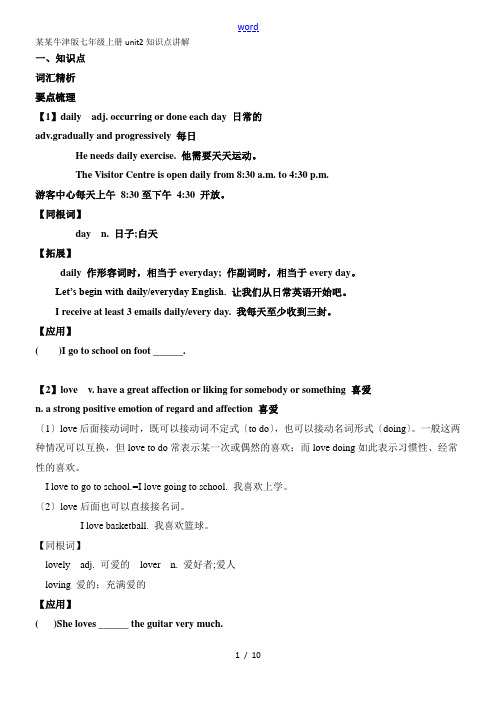
某某牛津版七年级上册unit2知识点讲解一、知识点词汇精析要点梳理【1】daily adj. occurring or done each day 日常的adv.gradually and progressively 每日He needs daily exercise. 他需要天天运动。
The Visitor Centre is open daily from 8:30 a.m. to 4:30 p.m.游客中心每天上午8:30至下午4:30 开放。
【同根词】day n. 日子;白天【拓展】daily 作形容词时,相当于everyday; 作副词时,相当于every day。
Let’s begin with daily/everyday English. 让我们从日常英语开始吧。
I receive at least 3 emails daily/every day. 我每天至少收到三封。
【应用】( )I go to school on foot ______.【2】love v. have a great affection or liking for somebody or something 喜爱n. a strong positive emotion of regard and affection 喜爱〔1〕love后面接动词时,既可以接动词不定式〔to do〕,也可以接动名词形式〔doing〕。
一般这两种情况可以互换,但love to do常表示某一次或偶然的喜欢;而love doing如此表示习惯性、经常性的喜欢。
I love to go to school.=I love going to school. 我喜欢上学。
〔2〕love后面也可以直接接名词。
I love basketball. 我喜欢篮球。
【同根词】lovely adj. 可爱的lover n. 爱好者;爱人loving 爱的;充满爱的【应用】( )She loves ______ the guitar very much.【3】seldom adv. not often 很少;不常I seldom go to the cinema. 我很少去看电影。
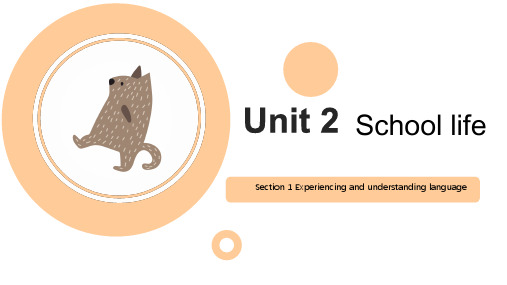

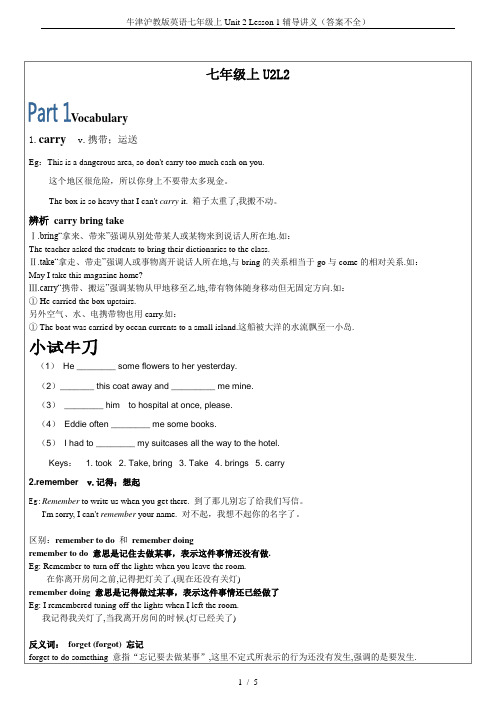
七年级上U2L2Vocabulary1.carry v.携带;运送Eg:This is a dangerous area, so don't carry too much cash on you.这个地区很危险,所以你身上不要带太多现金。
The box is so heavy that I can't carry it. 箱子太重了,我搬不动。
辨析carry bring takeⅠ.bring“拿来、带来”强调从别处带某人或某物来到说话人所在地.如:The teacher asked the students to bring their dictionaries to the class.Ⅱ.take“拿走、带走”强调人或事物离开说话人所在地,与bring的关系相当于go与come的相对关系.如:May I take this magazine home?Ⅲ.carry“携带、搬运”强调某物从甲地移至乙地,带有物体随身移动但无固定方向.如:① He carried the box upstairs.另外空气、水、电携带物也用carry.如:① The boat was carried by ocean currents to a small island.这船被大洋的水流飘至一小岛.(1)He ________ some flowers to her yesterday.(2)_______ this coat away and _________ me mine.(3)________ him to hospital at once, please.(4)Eddie often ________ me some books.(5)I had to ________ my suitcases all the way to the hotel.Keys: 1. took 2. Take, bring 3. Take 4. brings 5. carry2.remember v.记得;想起Eg:Remember to write us when you get there. 到了那儿别忘了给我们写信。

七年级上U2L3I. Vocabulary1.try[trai]vt. 试,尝试,试用:He tried his fortune in another city. 他在另一个城市碰碰运气。
The foreign guests are trying chopsticks. 外宾们纷纷试着使筷子。
He is eager to try the new car. 他渴望试开那辆新车。
常用搭配try on 试穿try one’s best 尽力指点迷津try to do sth. 和try doing sth.两个词组都表示尽力做某事。
不过,try to do侧重尽力,为了达到目的而努力;try doing 只是一种新的尝试,并没有一定明显的目的性。
Why not try (go) by boat for a change? 为什么不换乘船呢?He tried (finish) the work ahead of time.他设法提前完成这件工作。
2.merry['meri]adj.快乐的;愉快的There is a merry smile on her face. 她脸上露出愉快的微笑。
知识拓展merry dance 欢乐的舞蹈merry pace 轻快的步伐merry smile愉快的微笑3.off [ɒf] adv.减掉;扣掉He pulled off his overcoat and began to work. 他脱下大衣,开始工作。
指点迷津off 和away这两个词的共同意思是“离开”,不过有一定的区别:1.在含义上:away表示“距离”,表示off“分开”;away强调“不在一地”,off强调到“另一个地方”。
2.away和off有时在作一种意义解时可互换,而作另一种意义解时则不能换用。
3. away只作副词,off而除作副词外,还可用作介词。
4.medium ['miːdɪəm] adj.中间的;中等的;适中的The blue cap is a medium size. 那顶蓝色帽子就是中号的。
英语初一专题系列之Unit 2 Daily life1. between…and… _________________________2. 把某物送给某人________________________3. once or twice a week_________________________4. on foot _________________________5. 过得愉快_________________________6. 放学后_________________________7. 教某人做某事_________________________8. in the middle of _________________________ 9. 参加_________________________10. by doing sth _________________________ 11. How often _________________________12. junior high school _________________________ 13乘公共汽车_________________________14. 在…末尾_________________________15起床_________________________16. play the piano _________________________1. Listen to a boy talking about his weekend.【考点聚焦】Talk about意为“___________”,后面既可以接人, 也可以接物。
Let’s talk about the problem.The students are talking about the new teacher.2. 辨析That’s right. All right与That’s all right[考点聚焦]①That’s right___________。
(对别人所说的话表示肯定)②All right___________ ; ___________;___________。
③That’s all right___________; ___________(客气话和道歉的回应)—The book is very interesting.—That’s right.[考点聚焦]①助动词do/does/did后面要跟动词原形;②每周一两次注意:在英语中, 表示一次用once, 两次用twice, 表示三次或者三次以上就用基数词+times(time在这里是可数名词, 表示次数, 需要加s)如:once a week, twice a week, three(four/ five…)times a weekI play computer games once or twice a week.She (watch)TV (一周两次)1. —Would you please help me do the dishes, John?(2016吉林长春中考)—___________, but I’m busy cleaning my room.A. You’re welcomeB. I’m sorryC. It doesn’t matterD. That’s right2. —The programme is very popular.—___________ We all like it.A. That’s rightB. Not at allC. It doesn’t matterD. You’re welcome3. Let’s discuss the problem after school.A. talk toB. talk aboutC. know aboutD. think about4. 他一周上一两次网。
He surfs the Internet _________________________________a week.5. I go swimming twice a week. (对划线部分提问)_________________________________ do you go swimming?4. how often do you watch television.[考点聚焦]①how often 多久一次, 询问动作发生的频率(上节学过的特殊疑问句, 现在再来复习)how often 多久一次回答:once a week;three times a month how soon 多久以后回答:in an hour;in two weekshow long 多长时间(还可以用于对物体长度提问)回答:three days;four weekshow far 多远回答:ten miles, three minutes’ walk —How often do you exercise?—___________(一周四次)②watch television= watch TV 看电视[辨析]watch、look、see、readwatch “观看、注视”, 全神贯注地看看电视、比赛、实验、表演等Watch TV/game/matchlook “看、望”, 指动作的过程, 表示有意识地看, 但不强调看的结果, 后加介词”at”Look at 看look for寻找Look after 照顾see “看”, 强调动作的结果, 但不一定是有意识地看See a movie /doctor read 主要指看书、看报、看杂志Read newspaper 看报纸5. Classes start at 8 am, and I am seldom late.at 在这里表示时间, “在”如:at half past two 在两点半at (后+时间)在具体的钟点(后+地点)小地方用”at”at 8 am; Arrive at schoolin (后+时间)指上午、下午或晚上;年月或季节(后+地点)大地方用”in”In the morning; In January ;in spring ;Arrive in Beijingon 具体日期, 在星期几前, 在节日前, 某天的上下午On May 21st;on Monday. On New Year’s Day. On the morning of May 2nd.一言辨异:Look! The boy is watching the football game, his father is seeing a film, and his mother is reading a newspaper.7. I enjoy learning about different places in the world.①Different:不同的。
反义词:___________Be different from ““②enjoy doing sth= like/love doing sth___________enjoy oneself相当于___________和___________③___________:获悉;了解1. My father goes to work on foot every day.My father ______________________every day.2. —Could you tell me it takes to walk to the Disneyland?(2016陕西中考)—About 20 minutes.A. how farB. how longC. how oftenD. how soon3. at this picture. can you the cat under the table?A. Look;lookB. See;lookC. Look;seeD. See;look at4. 同义句改写Do you enjoy yourselves at the party?Do you ______________________at the party?Do you ______________________at the party?5. The accident happened ___________7p. m___________ 9p. m. (2012内蒙古呼和浩特中考)A. from;toB. between;toC. from;andD. between;andBreak n. 可数名词休息。
have /take a break=have /take a restV. 动词。
打破, 打碎。
Break the window[考点聚焦]①when在这里不是表示询问时间, 而是一个连词, 表示”当···时候”, 后面加一个句子。
此处连接两个先后发生的动作;也可表示两个动作同时发生。
②ring 是不及物动词, “打电话”n. 电话, 环形物(戒指)。
如:give sb. a ring A magic ring10. How Short it is. 这是一个由how引起的感叹句【高频考点】概念:用来表达喜、怒、哀、乐等强烈情感的句子是感叹句, 句末用感叹号, 一般用感叹词how或what引导句型为:(1)how+形容词/副词+主语+谓语(有时也可以省掉主谓语)这个公园多漂亮啊!______________________(2)What+a/an +形容词+单数可数名词+主语+谓语!What a kind man he is!Tom是多么诚实的一位男孩啊!______________________(3)What+形容词+不可数名词/复数名词+主语+谓语!What fine weather it is today!What beautiful flowers these are!他们是多么聪明的学生啊!______________________[考点聚焦][考点聚焦]exercise意为_________________________________ , 一般用语, 可指训练, 锻炼, 操练等①作可数名词用, “练习, 习题, 体操, 功课, 操练”等, 常用复数。
I'm doing my exercises.②作不可数名词用, “锻炼, 运动”。